Disclaimers:
- These charts are NOT meant to be taken as an absolute or definitive display of ethnic origins for modernday populations!
- Ethnic labels given by Europeans do NOT per se reflect how the slaves would have self-identified themselves! (see this article for more discussion)
- Take note of the sample size, time period, region and any other details given to familiarize yourself with the CONTEXT of the data!
- Even if limited in scope, valuable information can still be obtained if you look for the patterns!
- Sorry for all the exclamation marks 😉 It’s just that i’ve seen these kind of charts being misinterpreted so many times, not only online but also by trained historians. Which is a shame really because misleading conclusions can easily be avoided if you just take these charts for what they are: sample based data which might provide us with extra clues about the ethnic composition of Africans being taken to the USA during a given time period and for a given place/region. All depending on how representative the samples might have been.
*********************
Regional Origins
Trans Atlantic Slave Voyages (Inter-Colonial & Domestic Slave Trade not included!)
For more details read “African American AncestryDNA Results”
***(click to enlarge)

Source: http://abolition.nypl.org/maps/
***(click to enlarge)

Source: Trans-Atlantic Slave Trade Database (2010 Estimates) (http://www.slavevoyages.org)
***(click to enlarge)
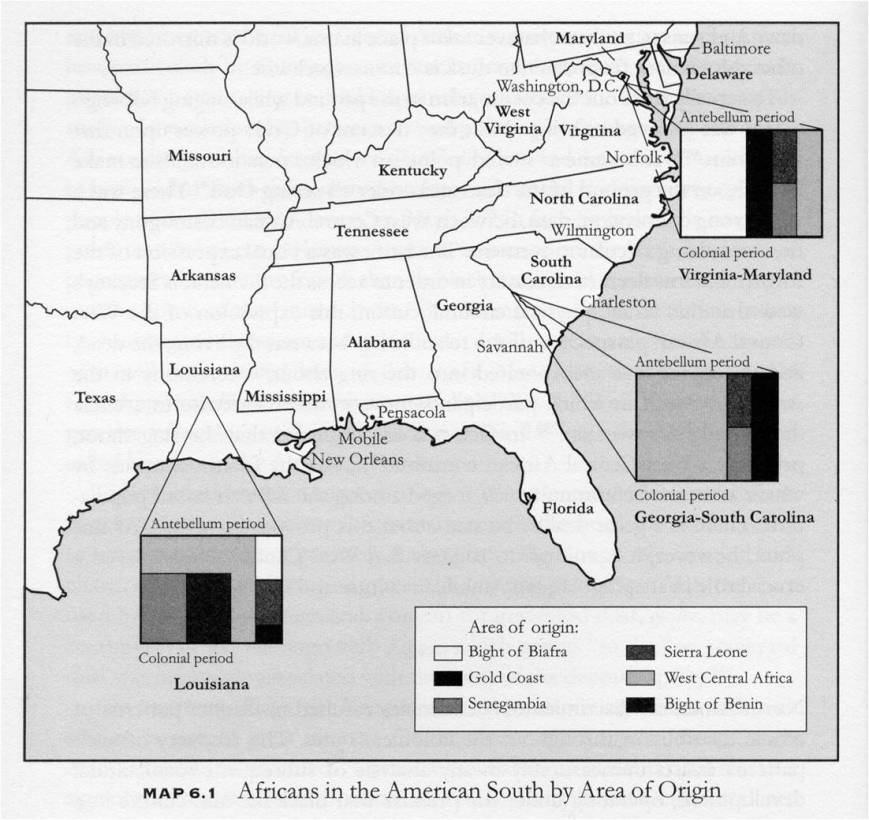
Source: “Exchanging Our Country Marks: The Transformation of African Identities in the Colonial and Antebellum South”, (Michael Gomez, 1998).
***
Trans Atlantic Slave Voyages & Inter-Colonial Slave Trade (via West Indies)
For more details read “Benin/Togo region”
***(click to enlarge)
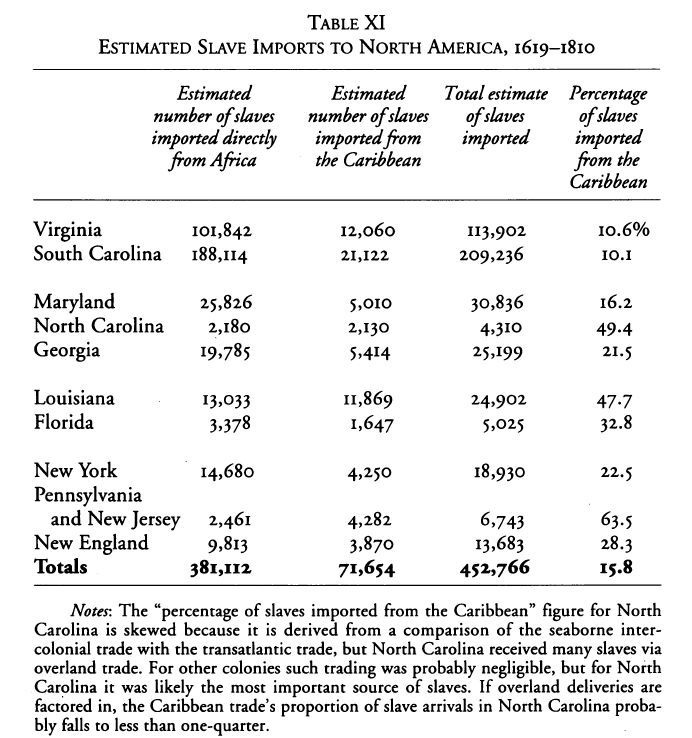
Source:”Beyond the Middle Passage: Slave Migration from the Caribbean to North America, 1619-1807″, : (G. O’Malley, 2009), The William and Mary Quarterly, 66, (1), 125-172.
***(click to enlarge)
____________________________________
Gullah
Linguistic influences from Africa
For more details read “Comparing the Gullah language with other English-based Creoles”
***

From “Out of Africa: African Influences in Atlantic Creoles” (Parkvall, 2000)
***

From “The Gullah People and Their African Heritage” (Pollitzer, 1999)
***

From “The Gullah People and Their African Heritage” (Pollitzer, 1999)
***

From “The Gullah People and Their African Heritage” (Pollitzer, 1999)
____________________________________
Louisiana
Louisiana Slave Database (1719-1820)
For more details read “Louisiana: most African diversity within the United States?”
***(click to enlarge)
***New Orleans Baptism Database 1796-1803
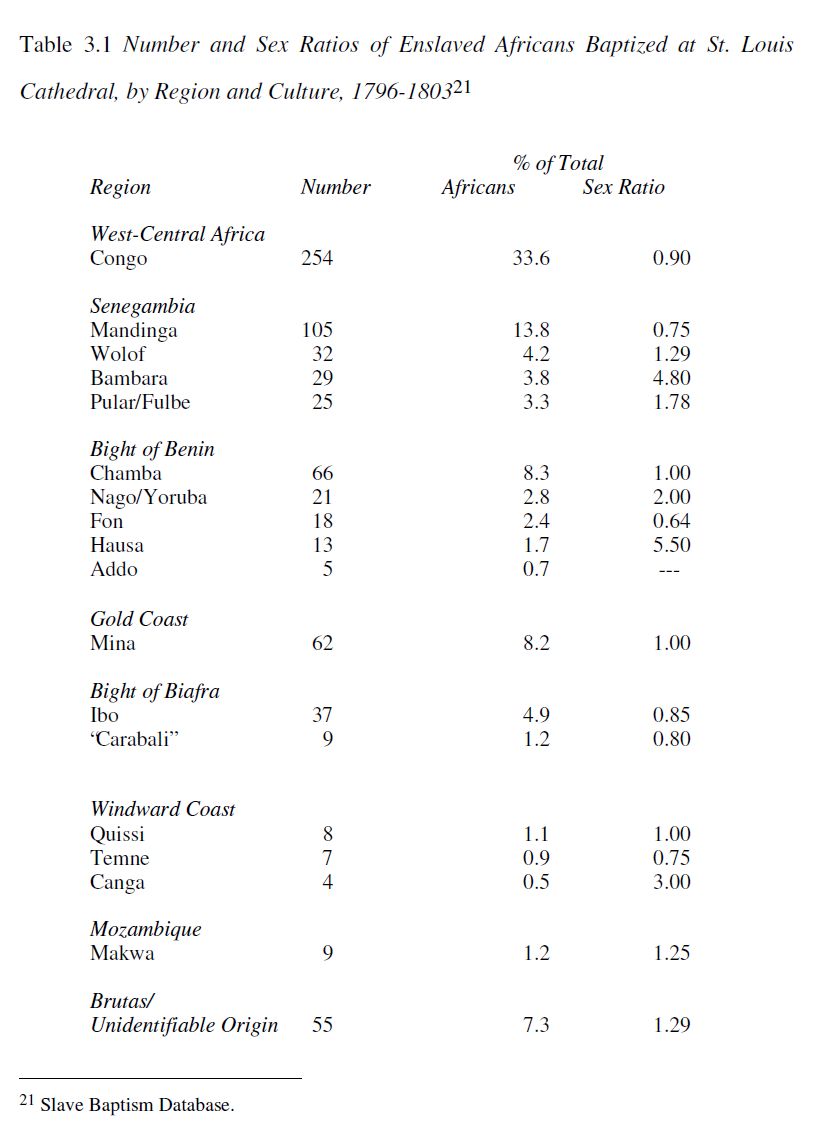
Source: “Slaves and Slavery in Louisiana – The Evolution of Atlantic World Identities, 1791-1831” (Roberts, 2003)
____________________________________
South Carolina
Runaway slaves 1730-1790
For more details read “Ethnic Origins of South Carolina Runaway Slaves”
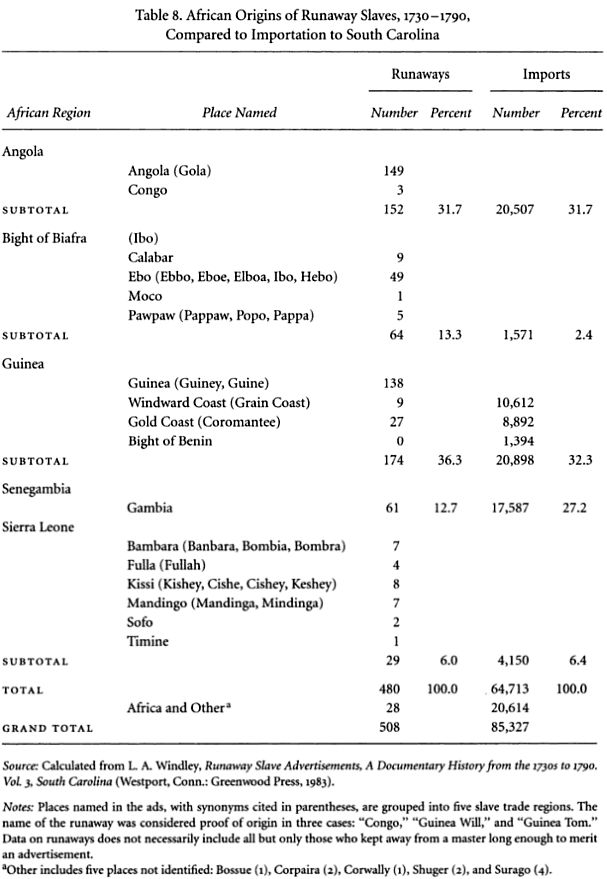
Pollitzer (1999, p.60)
***

Source: http://abolition.nypl.org/maps/
____________________________________
Virginia
Bight of Biafra ancestry
For more details read “The Igbo Connection for Virginia & Virginia-Descendants”
***
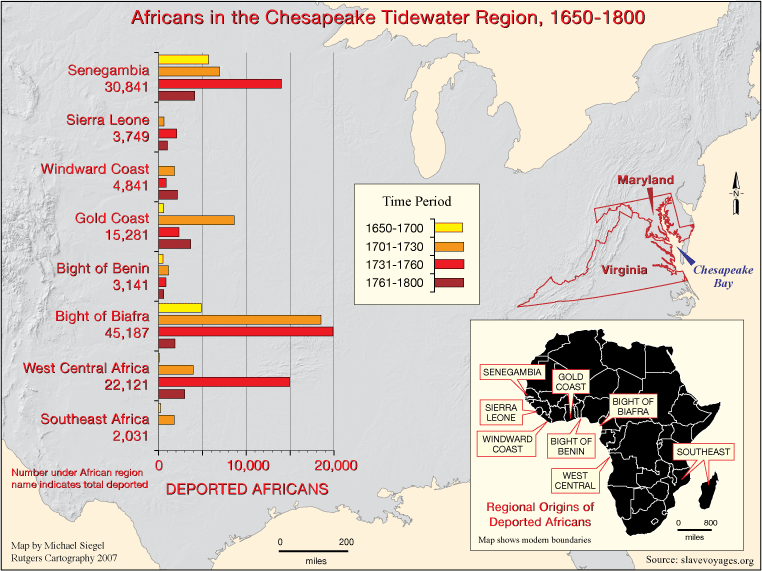
Source: http://abolition.nypl.org/maps/
***

Trans-Atlantic Slave Trade Database (2010) (http://www.slavevoyages.org/)
***

Trans-Atlantic Slave Trade Database (2010) (http://www.slavevoyages.org/)
***
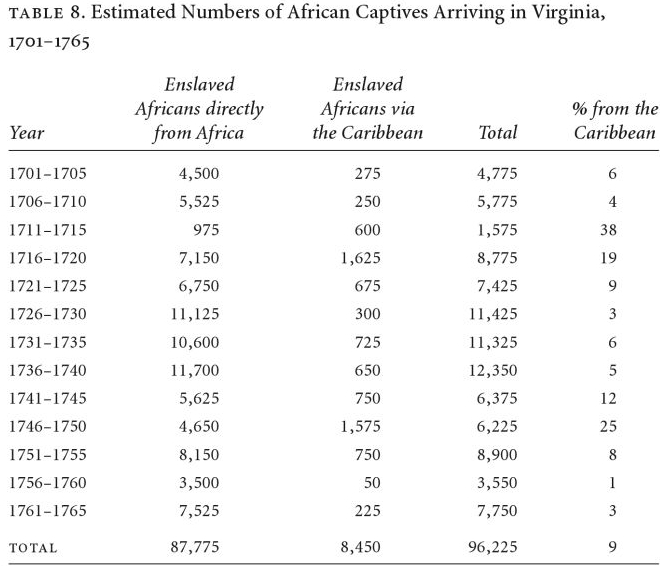
Taken from “Final Passages: The Intercolonial Slave Trade of British America, 1619-1807″ (O’Malley, 2014)
***



Hi,
Didn’t you have a table from slavevoyages.com with the countries of slaves origin in the different states like Pennsylvania, New York, Georgia and others
LikeLike
Hi Michael, specific details from those states can be viewed by doing a search in the slave voyages database: http://www.slavevoyages.org/voyage/search
Keep in mind though that for some states inter-colonial (West Indies) & domestic slave trade (VA & SC) might be of equal or even greater importance.
LikeLike
Can a Black American get a African Carribeans genetic communities instead of AFRICAN-American genetic communities ?
One more question
These Updates that ancestry give customers
Is it supposed to be more accurate ?
LikeLike
Yes depending on their particular family history and matching strength with Caribbean customers in Ancestry’s database.
Updates are intended to improve accuracy. But if they also manage to do so is a different question 😉 I will blog about this eventually. In case you have any further questions in the meanwhile Ancestry itself has a very heplful FAQ section:
https://www.ancestry.com/cs/dna-help/ethnicity/faq
LikeLike
G’day
I have ancestors from England and Africa. They met & bred on St Kitts. (Slave/ planter.)
My DNA says iberian peninsula, congo.
How / where do I search for the likely source / departure point of my slave ancestor?
We are talking arrival mid/ late 1700s to early 1800s.
Ive been at this for a while but am going crazy with so much info, not applicable.
Thanks
Barb
LikeLike
Hi Barb, these blog pages might be helpful:
https://tracingafricanroots.wordpress.com/tables-on-ethnicregional-background/anglo-carribean/
https://tracingafricanroots.wordpress.com/2015/02/04/st-kitts-anguilla-slave-census-least-informative-of-african-roots/
LikeLike
I just found out that Alabama use to be part of Mississippi!😁
Howcome there is no slave voyage for the slaves that were sent to Alabama ?
I swear most African slaves that were in Alabama came directly from Africa.
LikeLike
Indeed only one recorded slavevoyage it seems within the TAST database. But it also happens to be one of the most famous ones in American history: the Clotilda! I suppose it is possible other illegal slave voyages landing in Alabama/Mobile in the 1800’s have not been documented. But either way Domestic Slave Trade would have been more important. Read these websites for more info:
http://www.inmotionaame.org/home.cfm?site=html
http://abolition.nypl.org
LikeLike
But Howcome it doesn’t Show anything on the African origins of the people in Alabama.
Is Mississippi representing Alabama ?
What is the history of the Black people in Alabama as far as African slaves being sent there
I swear Alabama is also part of Louisiana cuz during the French colonizing Louisiana they divided it to Upper Louisiana & Lower Louisiana
Alabama, Mississippi, & Arkansas was part of Lower Louisiana.
LikeLike
Haha time to hit the history books then 😉 I have not done any research into Alabama myself. I can only repeat what I already told you that Domestic Slave Trade will be a huge factor. And therefore the African origins of Virginia & South Carolina should also be taken into account. Because cotton cultivation only started to get large scale after the Louisiana Purchase. Before that I believe Alabama’s population might have been quite small, although quite likely some enslaved Africans were then indeed transferred via Louisiana/Mississipi.
LikeLiked by 1 person
Now you have me interested, too. Mobile would seem to have been a natural slave port since it was one of the best natural harbors on the Gulf Coast. But I can’t find any information on how many ships arrived directly from Africa to Mobile. I do see some maps showing the inter-county trade showing slaves being shipped down from the Carolinas and Virginia, but, again, not even a general figure of how many slaves passed into Mobile.
LikeLiked by 1 person
Again I have not read a great deal about this. But I suppose New Orleans would most likely have drawn in most of the seaborne trade. Because its hinterland was more populated and/or offered better access to plantations requiring slave labour. While Mobile might have been more of backwater (relatively speaking), at least in the 1700’s.
Overland routes would certainly have increased in significance during the 1800’s. A few months ago I read this book which described the transfer of African Americans from a plantation in Virginia into Alabama. Highly recommended reading! It also provides a useful comparison of slavery in Jamaica versus in the USA. It’s called “A Tale of Two Plantations: Slave Life and Labor in Jamaica and Virginia” And it also has a very good website:
http://www.twoplantations.com/
LikeLike
Mobile has a history more closely related to Louisiana and it shows in dna estimates too
LikeLike
I would be much interested to see any Mobile Creole results you could share!
LikeLike
This website can also be useful to see how Slavery and population density developed in Alabama across time:
https://www.smithsonianmag.com/history/maps-reveal-slavery-expanded-across-united-states-180951452/
LikeLike
Hey FonteFelipe. I was wondering if you could give me a little insight into my results. I’ve been reading your site for a while now and just wanted to have your opinion what I’ve found. I’m a AA which I can confirm that my family is from South Carolina, USA but I think I have at least partial Hausa/Fulani background. My highest results are Nigeria = 38% Senegal + Mali 19% and Ireland + Great Britain + Europe West = 16%.
LikeLiked by 1 person
Hi AJ,
AncestryDNA’s socalled “Ethnicty Estimates” can provide very valuable insight but only within a (sketchy) regional framework. You will need additional context/info to pinpoint any specific ethnic details or also combine with other DNA results, especially any African matches you might have. Therefore I would advise you to systematically look into your matches first of all:
https://tracingafricanroots.wordpress.com/2017/05/10/how-to-find-those-elusive-african-dna-matches-on-ancestry-com/
From having seen the African matches of more than 50 African Americans already and also based on my review of historically documented ethnic references of African captives in the US i would say that the odds of having any Fula and Nigerian Igbo lineage are much greater than having any Hausa lineage. But again you will need additional clues to confirm.
The striking thing about your breakdown is of course the 38% “Nigeria” ! This gives your breakdown a more pronounced regional focus than the usually more fragmented standard. However i did observe similar high scores for the “Nigeria” region among my African American sample group (n=350). As it seems to be quite common even despite individual variation. For more details see:
https://tracingafricanroots.wordpress.com/ancestrydna/african-american-results/
LikeLike
Okay I can list the entire list of results. I’ve traced one distant relative who is a Jalloh from Senegal. I’ve spoken with many Fula from Guinea who verified that Jalloh is a Fulani last name. That was the only semi-concrete evidence that I could find to support my findings.
Nigeria – 38
Senegal – 17
Benin/Togo – 11
Ireland – 9
Cameroon – 7
Europe West – 5
Ivory Coast/Ghana – 3
South Eastern Bantu – 2
South Central Hunter Gatherers – 2
Great Britain – 2
Mali – 2
North Africa – 1
Less than 1 trace amounts of Native American and Asia Central
GedMatch – EthioHelix + French (Proxy for European)
West-Africa 46.32
Eastern-Bantu 14.86
French 13.41
North-Africa 8.48
Nilo-Saharan 3.98
Mbuti-Pygmy 3.73
Omotic 3.42
Biaka-Pygmy 3.08
Khoi-San 2.71
LikeLiked by 1 person
What part of South Carolina are you from? The planters in South Carolina had a distaste for “bight” slaves because they were a liability. There was also the issue of malaria, thus they targeted slaves who had a natural immunity to malaria which is very well known about Fulani. There was also a large Indigo plantation in the Barnwell/Aiken area. In that particular area, there were a few Tuareg slaves and could have been some Hausa because of their experience with indigo. There was no on the job training. They targeted slaves who had the knowledge.
LikeLike
Hey! Well I’m from North Carolina but some of my family is from Horry County & Beaufort, SC.
My uploaded my results into Gedmatch ran almost every test (which was relative) to get a general picture of how my DNA is put together and 90 % of the time (excluding the AA result) it keeps showing Nigerian Hausa or Fula with a secondary population of either Libya or Morocco and sometimes Egypt. Can someone break this down for me?
It sometimes feels like my background doesn’t quite fit the narrative for AA descended slaves.
LikeLike
Well again I would say that finding actual Hausa or Fula matches would be the best way to confirm. From what I’ve seen Gedmatch is no way reliable to pinpoint specific ethnic lineage for Afro-Diasporans whose ancestry is by default very intricate and therefore tricky to entangle.
It is a very common misconception that Gedmatch’s socalled Oracle predictions may depict shared ancestry with the listed reference populations. This is however NOT the case! It merely measures genetic similarity with a given selection of samples and not actual genealogical descent. These reference population might seem impressively specific and exact. However the truth is that your DNA is being compared to only a small and inherently limited subset of Africa’s VAST diversity which literally includes thousands of ethnic groups! (see this section of my blog: https://tracingafricanroots.wordpress.com/maps/ethno-linguistic/ )
In order for you establish a truly verifiable genetic connection with Africans it is best to search for autosomal African DNA matches. It will also help you put your regional breakdown into better perspective. See also this blogpost of mine:
https://tracingafricanroots.wordpress.com/2017/05/10/how-to-find-those-elusive-african-dna-matches-on-ancestry-com/
To be honest I have never taken much notice of Gedmatch and other third party websites because I found their ancestral categories not up to par with AncestryDNA (before the update). Going by other people’s reactions I also find Gedmatch to be highly confusing and potentially misleading because of the way their results are presented as seemingly very “precise” and “specific”. When in fact such a presumed accuracy cannot be attained with current DNA testing technology. AncestryDNA’s country name labeling may be misleading as well, but on a different scale I would say. Especially since they do mention the limitations of their “estimates” and also quite clearly illustrate the inevitable overlap through their regional maps.
The labeling of ancestral categories is trickier than many people may realize. But I find it more reproachable when false hope is being generated of pinpointing a particular “tribe” based on the ethnic labeling of DNA scores which again are merely based on some measure of genetic similarity with a given selection of samples and not actual genealogical descent!
The shakiness of these Oracle predictions is best revealed by simply experimenting with other calculators. You will quickly find that each time different results will appear. This variance being caused by the particular tweaking of algorithm and constellation with other reference populations! In other words nothing exact about it! And not really even indicative I would say going by the Gedmatch results of actual Africans I have seen which were usually off.
LikeLike
Hi were the ewe people taken to the united states? Also are the ewes and minas the same?
LikeLike
Hi Selim, yes that seems practically certain. I have seen American slave records referring to “Papa” or also “Popo” individuals. Which was a label many historians believe included Gbe speaking people, incl. therefore Ewe. Also direct slave trade between the USA and slave ports located within or very near Eweland (Volta region) has been documented. Additionally Ewe captives would also have been brought in by way of indirect slave trade with the Caribbean.
See also:
https://tracingafricanroots.wordpress.com/2019/09/10/akan-or-ewe-west-african-ancestrydna-results-2013-2018/
About the Mina ethnonym read these useful sources:
African Ethnicities and the Meanings of ‘Mina,’ (Gwendolyn Midlo Hall, 2003)
Ethnicities of Enslaved Africans in the Diaspora: On the Meanings of “Mina” (Again) (Robin Law, 2005)
LikeLike
Thank you FonteFelipe, So would have the Ewes been taken to America through both the Gold Coast and Bight of Benin?
LikeLiked by 1 person
Most likely yes. I will shortly publish my research findings about the African matches being reported for 50 African Americans on Ancestry. Among these matches are also people who are most likely Ewe (as suggested by their surnames). Although within itself an individual DNA match doesn’t provide conclusive evidence I do think the frequency of these matches and also the amount of shared DNA are quite telling. More details coming up!
LikeLike
Hello FonteFelipe, do you know why in Gwendolyn Midlo Hall’s slave database there is no Ewe representation? Also, why do you think Aja Fon and Arada are all together but Mina is alone?
LikeLike
I am not sure but I am guessing it is because the ethnonym of Ewe was not current yet in previous centuries. Instead other names were used. This is not surprising as the names of ethnic groups change all the time. Also depending on who is using the terms, either people of the ethnic group themselves or outsiders. The Yoruba for example originally were not known under that name but instead were self-identifying based on local kingdoms. It appears that the word “Yoruba” (or more correctly “Yaraba”) was originally in reference to the Oyo Empire and is the usual Hausa name for Oyo people. See also: https://en.wikipedia.org/wiki/Yoruba_people#Etymology
This history behind the naming of ethnic groups is a very fascinating but also confusing topic. Really if you want to learn more you should try to get hold of some more specialized and detailed literature on the Ewe as well as the broader Gbe speaking people (incl. Aja, Fon and Arada). I already gave you the links with a few articles written also by Gwendolyn Midlo Hall. If you look into the references of those articles you might get some more ideas. You should be careful when looking online though because regrettably there are also some questionable websites around which try to delink the Ewe from their properly West African heritage because of misguided ideological reasons.
Btw Gwendolyn Midlo Hall’s slave database also has a feedback option, so you could also try to get more clarification via this link:
http://www.ibiblio.org/laslave/feedback.php
LikeLike
Thanks!
LikeLiked by 1 person